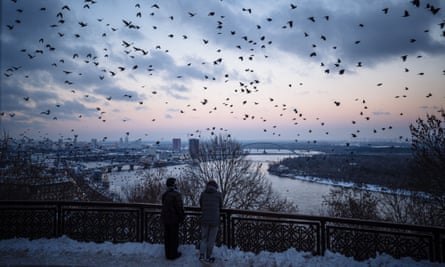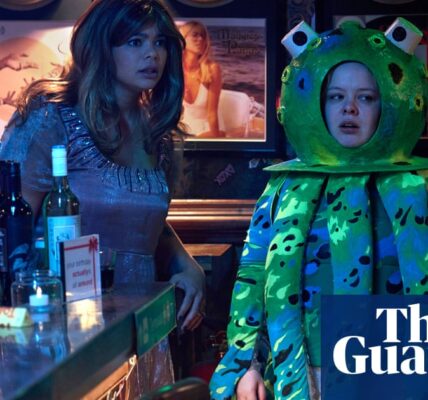Andrey Kurkov, a writer from Ukraine, expressed feelings of guilt for writing fiction during a period of war.
T
On the night of February 23, 2022, Ukrainian author Andrey Kurkov was having dinner with friends at his home in Kyiv. Little did he know that the next day, Russia would launch a full-scale invasion. Shortly after, he was warned that his name may be on a list created by Russia to target prominent Ukrainian individuals for arrest or worse. He was advised to leave the city immediately. Along with thousands of other Ukrainians, Kurkov and his wife hastily gathered their belongings and fled westward. From there, Kurkov became actively involved in raising awareness about the situation in Ukraine through various means such as articles, speeches, interviews, and broadcasts both at home and abroad. After four months, he returned to Kyiv and has since remained there as a vocal and dedicated advocate for a free and independent Ukraine.
Kurkov had already written 70 pages of his new novel before the invasion occurred. However, he struggled to continue writing fiction amidst the chaos. He explains, “I was able to produce a lot of journalistic work, but I couldn’t focus on writing fiction.” Last summer, he managed to write an additional 30 pages, but then encountered another block. He felt guilty indulging in the pleasure of writing fiction during a time of war. It seemed like a sinful act. Writing a novel requires immersing oneself in the fictional world, but Kurkov found it difficult to do so when his reality was consumed by war. He felt trapped by the constant need to check the news and it even disrupted his sleep as he woke up multiple times during the night to check for updates.
Due to the international publishing schedule, Kurkov’s latest novel, The Silver Bone, will be released in the UK and US next month, despite his break from writing fiction. This will be his 12th novel to be translated into English and the first installment of a new crime series titled The Kyiv Mysteries. Interestingly, the book begins in a chaotic and war-torn Kyiv, where the main character Samson Kolechko, a former electrical engineering student turned detective, witnesses his father’s brutal murder in the very first line. By the third sentence, Samson himself is severely injured. Although Kurkov is now well-versed in the dangers of wartime life in Kyiv, he actually wrote The Silver Bone several years prior to Putin’s invasion and the story takes place over a century before the current conflict began.
He states his fascination with the time period following the end of World War I. One of his unpublished novels explored the events during that time, and this current book is set in 1919 during the four-year war when Ukraine declared its independence after the collapse of the Russian empire, only to lose it again. The constant shifting of power between Bolsheviks, White Russians, and different Ukrainian factions occurred every few months, resulting in 14 changes in leadership within four years. The time was marked by extreme instability and those who remained in Kyiv had to adapt to the frequent changes, while others fled with the losing factions or faced violence. Despite the danger, he finds this period intriguing. He also notes the present-day similarities as Russia attempts to exert control over Ukraine, potentially turning it into a Soviet or Russian republic or something else.
Kurkov himself embodies many of the complications of the relationship between Ukraine and Russia, as well as the tensions within Ukraine. He was born in 1961 near what was then Leningrad, where his father was an air force test pilot and his mother a doctor. His father was posted to Ukraine when Kurkov was two, and he has lived there ever since. Kurkov writes his fiction in his first language of Russian, although he writes journalism and other prose in Ukrainian. His work has been banned in Russia since 2014.
Kurkov gained international recognition with his novel Death and the Penguin in 1996, which was later published in English in 2001. The novel displayed his unique blend of satire, surrealism, dark humor, social commentary, and well-developed characters. His writing often delves into detailed aspects of Ukrainian life, politics, and crime, influenced by his career in journalism and the rapidly changing history of Ukraine. This is not the first time Kurkov’s work has shown an unexpected foresight, as previous books have included events such as the gas crisis between Russia and Ukraine, and the poisoning of a presidential candidate, which later came to pass. In his 2018 novel Grey Bees (published in English in 2022), Kurkov focuses on the repercussions of Russian aggression and is set in the contested Donbas region of Ukraine following Putin’s 2014 annexation, considered by many to be the catalyst for the ongoing conflict.

The origin of The Silver Bone originated from a generous reader who provided Kurkov with a significant amount of secret police files from the Bolshevik era after World War I. These documents were once owned by her father, a former KGB officer who later worked for the Ukrainian secret service. Kurkov explains that the files contained handwritten accounts from individuals who were accused of various crimes, but claimed their innocence. These offenses were often considered normal in other countries and times, such as owning cattle but not being allowed to sell meat or leather. Private trade was also heavily penalized, with a minimum sentence of three years in prison. The documents also revealed peculiar taxes on items like furniture and underwear. Kurkov was intrigued by the daily life details in wartime Kyiv portrayed in the documents and aimed to capture this texture in his novel.
The opening scene of the story features White Russian Cossacks as the ones responsible for murdering Samson’s father. During this time, they were in a struggle for control of the city against the new Soviet Red Army and various other political and paramilitary groups. Samson’s father is fatally injured with a sabre, causing his head to split in two, and Samson himself loses an ear from a slash. However, in a unique twist, Samson manages to catch his severed ear before it falls into the gutter and keeps it safe in a box. This event leads to Samson gaining a newfound ability to hear conversations that he wouldn’t normally be able to, which becomes crucial to the crime story as he overhears renegade Russian soldiers plotting.
Kurkov believes that incorporating a crime storyline and featuring a young detective like Samson, who is driven by a quest for justice and order amidst the chaos of war, allowed him to delve into and shed light on a society experiencing extreme tension. While the first two books of the Kyiv Mysteries series were released in Ukraine prior to the Russian invasion, Kurkov notes that he tends to receive more recognition internationally than domestically. He attributes this to the decline in reading of fiction in Ukraine, as well as the fact that he writes in Russian, which results in fewer reviews at home. However, Kurkov acknowledges his loyal readership and the translation of his books into Ukrainian, but acknowledges that some may argue that authentic Ukrainian literature must be written in the Ukrainian language.
Ignore the newsletter advertisement.
after newsletter promotion
Kurkov has previously discussed how the use of the Russian language in Ukraine has fluctuated in significance over time. However, currently, it is a highly contentious issue. He highlights that Ukraine is a diverse and multilingual country, with not only Russian speakers but also minority groups such as Crimean Tatars and Hungarians who use their own languages in writing and speaking. He also notes that prior to the invasion, roughly 40-45% of Ukrainians were able to speak Russian. However, a disproportionate number of these individuals have been killed by the Russian army in the eastern region and many others have been forced to flee as refugees. Kurkov predicts that after the war, the percentage of Russian speakers in Ukraine will decrease to around 20%, and while their descendants may be bilingual, speaking Ukrainian will be seen as a symbol of patriotism.
He claims to not be concerned about the matter, mentioning in passing that Kharkiv was originally a Ukrainian-speaking city but later became predominantly Russian-speaking after World War II. He also points out that prior to World War II, Polish was the main language spoken in Lviv. These are the historical facts. While Ukrainian will remain the dominant literary language in Ukraine, there will still be a space for Russian-language poetry and prose.
After the invasion, Kurkov primarily used English to communicate as he spoke and wrote for international media outlets. He recalls being overwhelmed with requests from all corners of the world, but now recognizes that the focus on the conflict in Ukraine is dwindling. The current situation in Gaza has captured the attention of politicians and the public globally, which Putin likely sees as an opportunity. He would prefer for other international conflicts, such as China attacking Taiwan or Serbia attacking Kosovo, to divert attention from Ukraine.
According to Kurkov, there are current issues with the war’s future. One concern is the difficulty in passing a mobilization bill to increase recruitment for the Ukrainian army. Additionally, there is worry about the lack of ammunition reaching the military. Kurkov notes that Ukraine is at a disadvantage compared to Russia, which has access to arms from Iran and North Korea as well as their own supplies. However, some countries such as Great Britain and the Baltic states are fulfilling their promised arms deliveries and are aware of the potential dangers. Ukrainian politicians continue to reject the idea of negotiating with Russia, but if the western countries push for negotiations, it will become apparent if new arms are not delivered within the next 12 months. Only time will tell.
According to him, the Ukrainian president, Volodymyr Zelenskiy, and his government still have public support, but that does not mean that everyone agrees with all of their actions. Despite this, he notes that people are trying to maintain a sense of normalcy, with full theaters and open museums. However, the recent Russian missile attacks and air raid alerts have left people traumatized and struggling to hide it. The morning he spoke to me from Kyiv, there were still ongoing attacks and people were only able to get some sleep. As a result, many are tired but still carry on with their daily lives.
Kurkov was getting ready for the second anniversary of the war on February 24 by finishing tasks for international media. Afterward, he planned to resume working on his unfinished novel, the third installment of the Kyiv Mysteries series. He explains, “When the war began, I felt that while fiction was effective in communicating during times of peace, it didn’t feel sufficient during times of war. But I still dream of it,” he adds. “I dream of writing fiction again, so I’m going to make another attempt. If it had been a novel about something abstract and distant from reality, I probably wouldn’t be able to finish it until the end of the war. However, since I’m writing about Kyiv during wartime, I hope to have something more meaningful to say now. Regardless, I’m going to try. We’ll see how it goes.”
Source: theguardian.com


